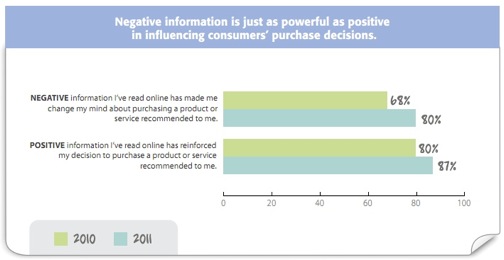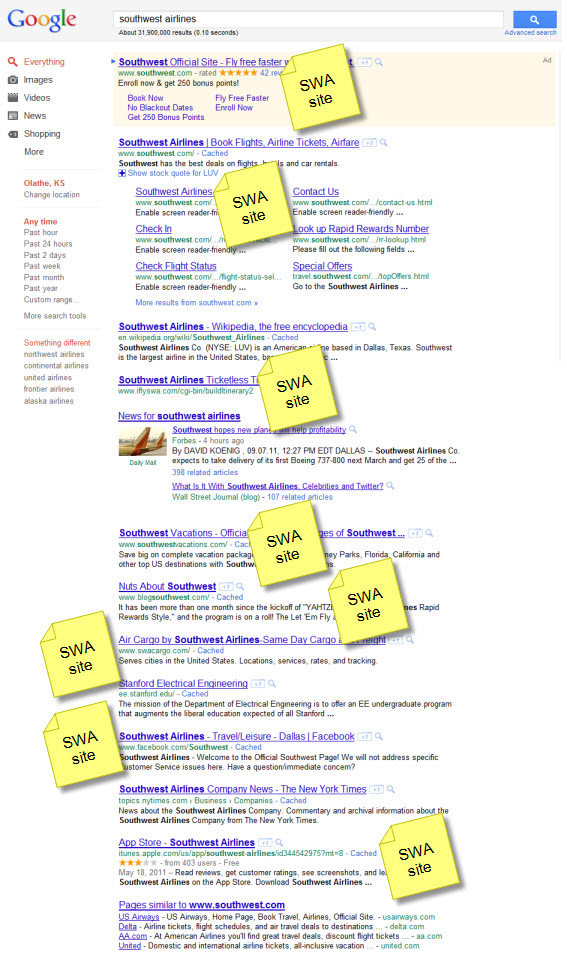So, you just Googled your business name and saw something there that didn’t please you. What was it? RipOffReport.com, ComplaintsBoard.com, Scamfound.com, or maybe just some negative reviews on Yelp or some other reputation site. What to do? What to do?
First of all, is it a big deal?
YES! In a recent survey performed by Cone, a brand marketing agency, results show that 80% of those interviewed have changed their purchase decision based upon a bad review they read, up from 68% in 2010.
Visit Orbital Alliance for the complete story, including a look at how many people are doing online research before making a buying decision.
Anyway, you want to get rid of this negative site. Most of these kinds of publishers won’t remove the content, so the best strategy is to move the negative result to the second page of the search engine – a strategy known as Online Reputation Management.
I just looked up Online Reputation Management (ORM) and didn’t really have any luck finding a website that explained – in simple terms – how ORM works. So, I’m going to do my best to translate their internet gobbledygook into something that makes sense.
Let’s start with one of my legen- . . . (wait for it) . . . -dary analogies.
You’re a photographer. You’re putting together this year’s “Hunky Firemen” calendar for a local charity so you go to meet the firemen at Station 114. Eleven of them live up to their stereotype and you know they’re gonna look great with their shirts off. Unfortunately, one of them looks like he spends a little too much time eating chicken wings at the local pub. How are you going to put together a great calendar with this guy in it? (Sorry to all ugly or chubby firemen! No disrespect intended! Hey, I almost used the cheerleader calendar analogy, but I knew you guys could handle it.) So anyway . . . you gotta get yourself a new hottie fireman if you want your calendar to be successful. Well, that’s exactly what you do. You go down to Station 116 and get a handful of cute firemen to volunteer. So that you don’t get any flack for playing favorites, you put all of the firemen up for a vote and at the end of the day, your ugly duck doesn’t make the cut. You end up with 12 great looking firemen for your calendar.
Let’s translate.
Of course, the firemen represent websites on page one of the search engine. Our rejected firemen is the RipOffReport.com website that kept coming up when people Googled your business name. The other firemen represent the other sites on page one and the firemen from station 116 are new sites that you create that are relevant to your business name. Votes are links. It’s that simple.
Okay, I’ll be a little more forthcoming. You have to get Google to rank ten sites that positively reflect your business on page one and get the bad site to page two. You do that by building links (votes) to all of the sites that are lower than RipOffReport.com. Maybe it’s your linkedin page, or your blog, or even your twitter page. Build lots of links to these sites until they outrank the ugly fireman.
Chances are, though, that there may not be ten great web properties about your business, so you may have to build some. That’s easy enough. Create fresh, relevant content about your business and build yourself a Web 2.0 property – something like a wordpress page or a squidoo lense. (These are the firemen from Station 116.) Then you build links to these too – lots and lots of links.
Some SEOs will even tell you that you can buy links for these new sites because if you do get a Google penalty for buying links, you can just build a new property and start the process over – no big deal. I’ll leave that part of the strategy up to you.
Bottom line, if there’s a negative website ranking for your business name, you have to optimize TEN other sites to ensure that it moves to page two. And that can be very time consuming and/or expensive. But what’s it worth? Or the better question – how much is that negative site hurting your businesses? If they’re looking you up by name, they’re considering doing business with you. You can’t ask for a better lead. When they see RipOffReport.com (whether the information is true or not, BTW), they’re likely to go on to the next business. And with so many people doing online research before making a buying decision, that can really put a damper on business!
For a great example of a company that practically owns page one for their business name, Google: Southwest Airlines and take a look. Even their itunes app is ranking!
If you’d like help with your own Online Reputation Management, please feel free to contact me. Thanks!
-David McBee



[…] Reputation Management by David McBee — Presentation Transcript UNDERSTANDING ONLINE REPUTATION MANAGEMENT • Do your potential clients see negative reviews, bogus claims, and “Rip-Off Report-type” […]
You are pretty good at this Internet Marketing stuff.
brinkka2011 says: Thanks so much for posting all of the good content! I am looking forward to reading more.